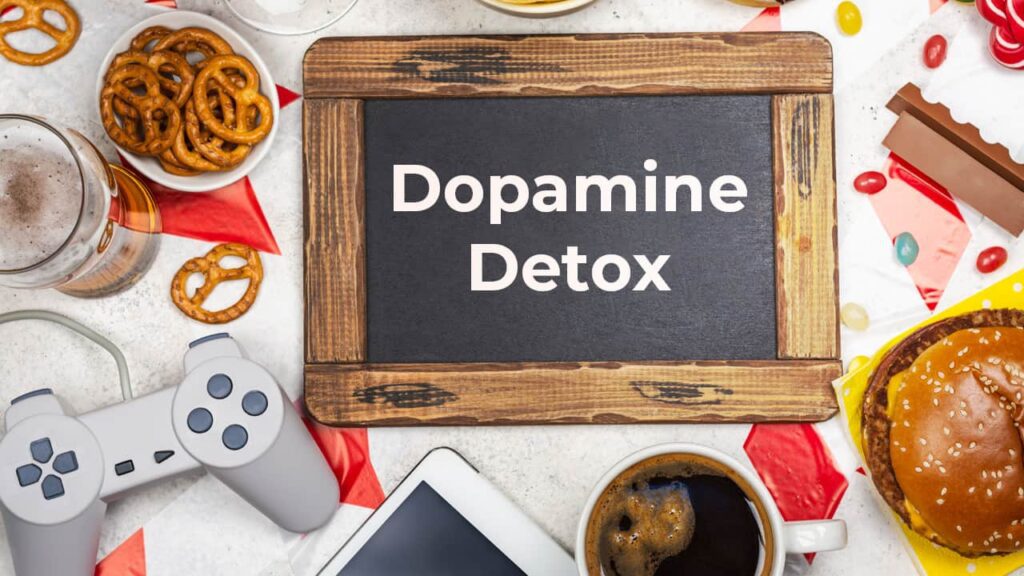Dopamine detox is a neurotransmitter that is involved in the sensation of pleasure as well as the experience of reward and motivation. It is created naturally inside the body and is involved in a significant number of the processes of the brain. Even though it is not feasible to rid the body of all traces of dopamine, there are some things that can be done to help maintain healthy dopamine function, including the following:
Get a good night’s rest; not getting enough sleep might cause problems with dopamine synthesis and metabolism. Aim to get between 7 and 9 hours of sleep each night.
Maintaining a healthy level of dopamine function may be supported by maintaining a diet that is both balanced and rich in fruits, vegetables, and lean sources of protein. Steer clear of processed meals and foods high in sugar, since they might create fluctuations in your body’s dopamine levels.
Regular exercise has been demonstrated to maintain healthy dopamine function, so it’s important to make sure you get enough of it. Exercise should be performed at a moderate level for at least 150 minutes each week.
Reducing stress is important because chronic stress may impede the creation and function of dopamine. If you want to learn how to manage your stress more effectively, try some stress-reduction practices like meditation, deep breathing, or exercise.
Steer clear of alcohol and drugs since abusing these substances may cause dopamine function to be disrupted and lead to addiction. It is very necessary to abstain from alcohol and drugs if one want to maintain optimal dopamine function.
Dopamine is not the only neurotransmitter that plays a role in pleasure and reward; this is another important point to keep in mind. Pleasurable experiences are influenced by a number of other neurotransmitters in addition to dopamine.
why sleep matters for a dopamine detox
I know too many people who are ignoring sleep. Some of my mastermind clients ignore sleep because they are so focused on their businesses and dating lives.
A disturbed sleep-wake cycle in the brain may cause a disruption in the generation and metabolism of dopamine. This disruption can be caused by a lack of sleep. On the other hand, obtaining a enough amount of sleep may assist in maintaining good dopamine activity.
You may enhance your sleep hygiene in a number of ways, including the following:
- Maintain a regular pattern with your sleep by ensuring that you go to bed and get up at the same time each day, including on the weekends.
- Develop a soothing pre-sleep ritual by devoting the final hour of the day to slowing down and participating in things that help you unwind, such as reading or having a relaxing soak in a hot bath.
- Ensure that you have a pleasant atmosphere in which to sleep by ensuring that your bedroom is cool, dark, and quiet, as well as by purchasing a comfy mattress and pillows.
- Avoid using electronic devices in the hour or so before going to bed, since the blue light that is released by these devices might prevent your body from producing the sleep hormone melatonin. Make it a goal to stay away from screens for at least one hour before going to bed.
- Steer clear of coffee and alcohol in the hours leading up to bedtime since both of these substances have the potential to make it difficult to fall or stay asleep.
Your Diet matters!
Because the foods we eat may influence the generation and metabolism of dopamine in the brain, diet can be an important factor in the maintenance of optimal dopamine function in the body.
It is possible to maintain good dopamine function by eating a diet that is balanced and is high in fruits, vegetables, and proteins that are lean. Dopamine and other neurotransmitters can only be produced by the body if it is supplied with the critical nutrients that come from the sorts of meals listed below.
On the other side, consuming a diet that is heavy in processed meals and sugary foods may create spikes and crashes in dopamine levels, which can contribute to feelings of tiredness and irritation in certain people. These foods may also interfere with the body’s capacity to create dopamine and other neurotransmitters, which can cause chemical imbalances in the brain. This can lead to behavioral and emotional issues.
Fruits and vegetables, in addition to the nutrients they provide, also include antioxidants, which are substances that may assist in shielding the brain from the damaging effects of oxidative stress. This is significant because oxidative stress may inhibit both the generation and function of dopamine in the body.
REGULAR EXERCISE!
I put this one in bold because, AGAIN, so many people ignore it.
Exercising helps maintain healthy dopamine function in several different ways, as has been shown. To begin, engaging in physical exercise has been shown to increase the amount of dopamine produced in the brain. It is believed that this is one of the reasons why physical activity may improve one’s mood and assist in minimizing the symptoms of mental health conditions such as anxiety and depression.
Exercise may assist maintain healthy dopamine function by increasing the availability of dopamine receptors in the brain. This is in addition to the fact that exercise can increase the amount of dopamine that is produced. Dopamine receptors are proteins that attach to the neurotransmitter dopamine and play a role in the activity regulation of dopamine. Dopamine is able to attach to dopamine receptors more readily when there are more of these receptors accessible, which might result in an increase in the amount of dopamine signaling.
Dopamine production and function are both negatively impacted by stress, which may be ameliorated by engaging in physical activity. Chronic stress may lead to an overproduction of the stress hormone cortisol, which can interfere with the production of dopamine and other neurotransmitters.
Chronic stress can also lead to a decrease in the immune system’s ability to fight infections. Exercising may assist maintain healthy dopamine function by lowering stress, which is a common side effect of exercise.
Managing and reducing stress
Dopamine production and function may be negatively impacted in a number of different ways by chronic stress. The body’s “fight or flight” reaction, which is a natural defense mechanism that readies itself for action in response to perceived threats, is triggered in response to stress. The sympathetic nervous system is responsible for mediating this reaction, which is accompanied by the production of stress hormones like cortisol.
Cortisol is a vital hormone that plays a role in the regulation of a variety of different bodily activities; yet, when it is generated in excessive quantities, it may inhibit the creation of neurotransmitters like dopamine. Because chronic stress may cause an overproduction of cortisol, which in turn can interfere with the production of dopamine and other neurotransmitters and lead to chemical imbalances in the brain, it is important to find ways to manage and reduce stress.
Reducing stress may help promote healthy dopamine function by lowering cortisol and other stress hormone production. This can help support healthy dopamine function. There are many different methods available to assist reduce stress, such as the following:
Exercising: Studies have shown that working out may help lower stress levels and increase mood.
Meditation is a practice that entails bringing one’s attention to the here and now while letting go of one’s distracting ideas in order to achieve mental clarity.
The practice of deep breathing is a straightforward method that entails taking long, slow breaths in through the nose and then letting them out through the mouth.
Talk therapy: Speaking with a therapist or counselor may help you establish healthy coping methods and assist you in working through the effects of stress.
Avoid drugs and alcohol
Abuse of substances, such as alcohol and narcotics, may cause a disruption in the function of the dopamine system and ultimately lead to addiction.
Dopamine is a neurotransmitter that plays a role in the brain’s reward system. It is produced in reaction to enjoyable events, such as the use of alcoholic beverages or illicit narcotics. Dopamine is released in a quick and powerful manner when these drugs are consumed, which may contribute to emotions of pleasure and reward.
However, chronic use of substances like alcohol and cocaine may result in changes to the dopamine system in the brain. These changes can include a reduction in the number of dopamine receptors as well as an increase in the synthesis of an enzyme known as COMT. These alterations may bring about a drop in dopamine signaling, which in turn can bring about a decrease in pleasure and an increase in the desire for unhealthy behaviors.
Tolerance is a condition in which the body grows acclimated to the presence of a substance and, as a result, needs more substantial quantities of the substance to produce the same effect. Tolerance may be caused by chronic use of substances like alcohol and narcotics. This may develop to addiction, which is defined as an inability to regulate drug or alcohol use despite the adverse effects of continued usage.
YOU MIGHT ALSO BE INTERESTED IN THESE RELATIONSHIP POSTS
- Signs Your Ex Will Eventually Come Back
- Why do I dream about an ex I don’t talk to anymore? The truth
YOU MIGHT ALSO BE INTERESTED IN THESE FITNESS POSTS
MY YOUTUBE CHANNEL LINK



